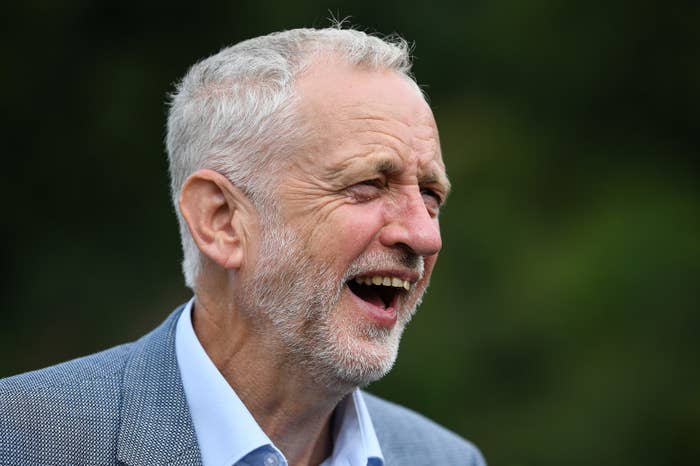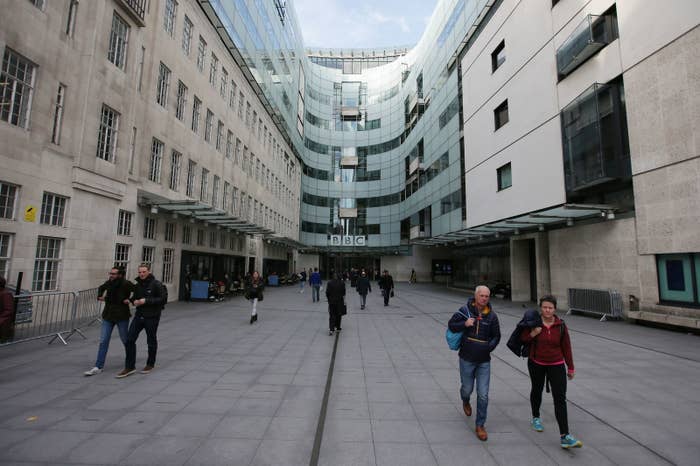
Labour leader Jeremy Corbyn will suggest introducing a new “digital licence fee” aimed at taking money from the likes of Google, Amazon, Facebook, and Netflix in order to provide more funding to the BBC.
It’s one of several new policies expected to feature in Corbyn’s widely anticipated speech on the media at the Edinburgh TV Festival in Scotland on Thursday.
Debates around the BBC’s “licence fee” — approximately £150.50 a year per household — have been around for years, with critics arguing it’s an expensive cost for people to pay. Corbyn will suggest that big US tech companies should be taxed in order for the British broadcaster to get more money.
“In the digital age, we should consider whether a digital licence fee could be a fairer and more effective way to fund the BBC,” Corbyn is expected to say.
“A digital licence fee, supplementing the existing licence fee, collected from tech giants and Internet Service Providers, who extract huge wealth from our shared digital space, could allow a democratized and more plural BBC to compete far more effectively with the private multinational digital giants like Netflix, Amazon, Google, and Facebook.
“This could also help reduce the cost of the licence fee for poorer households.”
Google and Facebook declined to comment on the so-called digital licence fee Wednesday evening. Conservative deputy chair James Cleverly labelled it an “Internet tax”, arguing it would be passed “straight onto families and businesses across the country — adding more pressure to weekly bills”.

During the speech, Corbyn is also expected to propose an effort to “democratise” the BBC by allowing staff and licence fee payers to elect members to the BBC board, which he’ll argue would reduce political influence on the organisation.
“One proposal would simultaneously reduce government political influence on the BBC while empowering its workforce and licence fee payers,” Corbyn is expected to say. “To help decentralise the BBC, national and regional boards could be expanded, with election by BBC staff and local licence fee payers.”
Among Corbyn’s supporters in the party, the idea of direct elections to leadership positions at the BBC has been around for some time. Last year, Labour MP Clive Lewis argued the BBC had a "structural bias" against the Corbyn-led Labour party and one way to help fix it might be to have the position of director-general elected by licence fee payers.
Speaking to BuzzFeed News on Wednesday night, journalism professor Charlie Beckett, from the London School of Economics, panned the idea, saying the broadcaster should not be treated like a political organisation.
“The BBC is not the NEC,” said Beckett, a former editor of BBC Newsnight. “I am violently opposed to it because the BBC is supposed to be independent, which means independent to the whims of public opinion.”
“It may have an institutional bias, which is middle class and metropolitan, and it should work on that, but [its] independence is the envy of the world. This is not Strictly Come Dancing, it shouldn’t be about viewer votes.”
Novara Media editor and Corbyn supporter Ash Sarkar told BuzzFeed News electing board members would lead to more diversity in management positions.
“The BBC has been quite good at diversifying their front of house, but we know that’s not something fed through to senior management level,” she said. “Unless you democratise you’re just going to see the replication of vested interests of the social order, which should be on the way out.”
Sarkar argues there need to be outsiders in the BBC who challenge the entire approach to how it covers life in Britain. “Over the last couple of years, we keep having these political events where journalists don’t see it coming. No one has thought, ‘Is it just because we’re talking to the same people? Listening to the same people?’
“I mean take a look at the [Westminster] lobby. It’s like the audience of a Coldplay concert.”
Corbyn’s also expected to say that a future Labour government would make sure that journalists could file Freedom of Information requests against private companies that provide public services, and grant charitable status to some media companies that do “local, investigative and public interest journalism”.
The big, set-piece speech will also give the Labour leader the chance to continue his long-running battle with certain parts of the media. Corbyn has regularly used hostility from parts of the right-wing press to his political advantage in front of cameras, calling out the Daily Mail and the Sun for their coverage of him and his leadership team during the Labour conference last year.
"Do you honestly believe that Britain is better off outside of the EU?" That was the question Channel 4 News asked Labour leader Jeremy Corbyn six times. https://t.co/Q5I7w5ESnu
In the run-up to the speech, Channel 4 has also been trying to make a point about Corbyn’s prickliness to answering some questions from journalists.
On Tuesday, a clip of Corbyn being interviewed by a Channel 4 reporter went viral after the Labour leader refused to provide a straight answer to a question about the economic impacts of Brexit. He later got frustrated after another Channel 4 reporter put the same question to him again.
